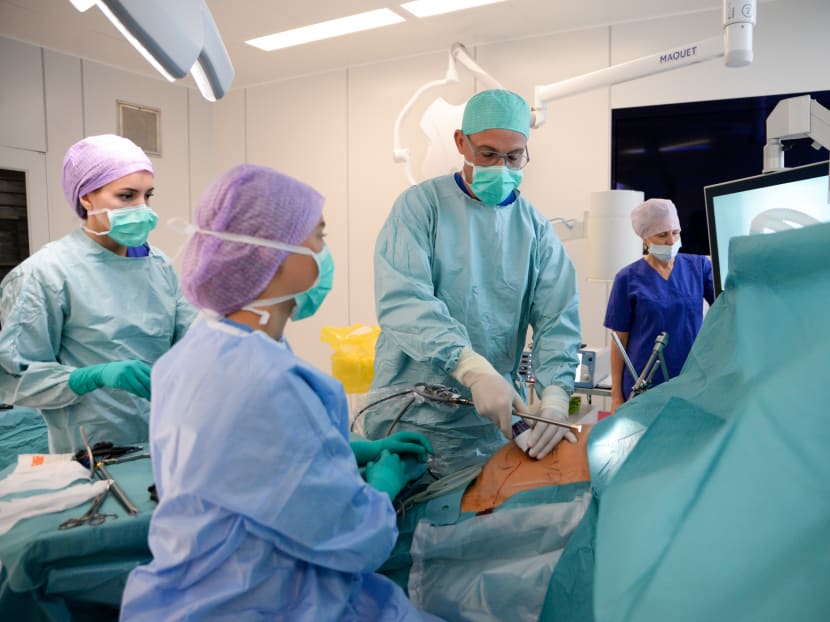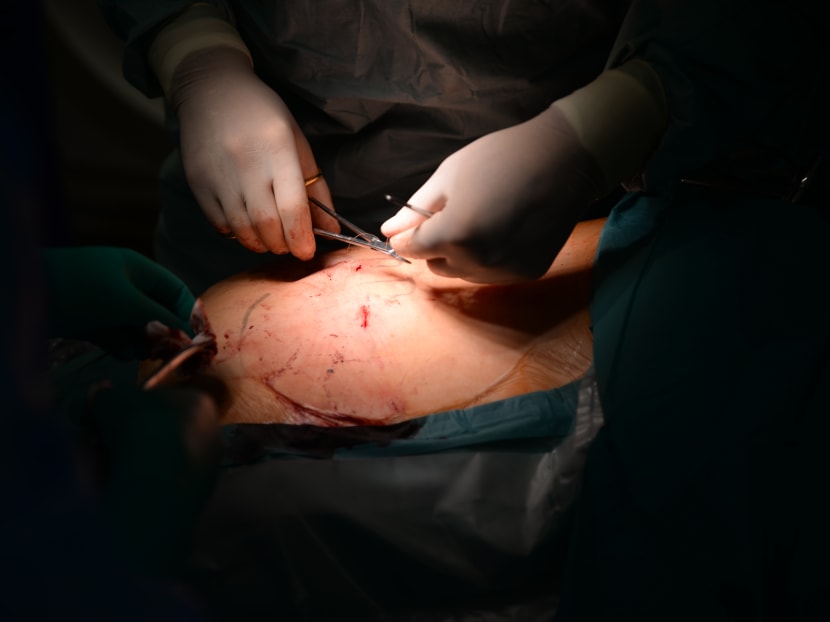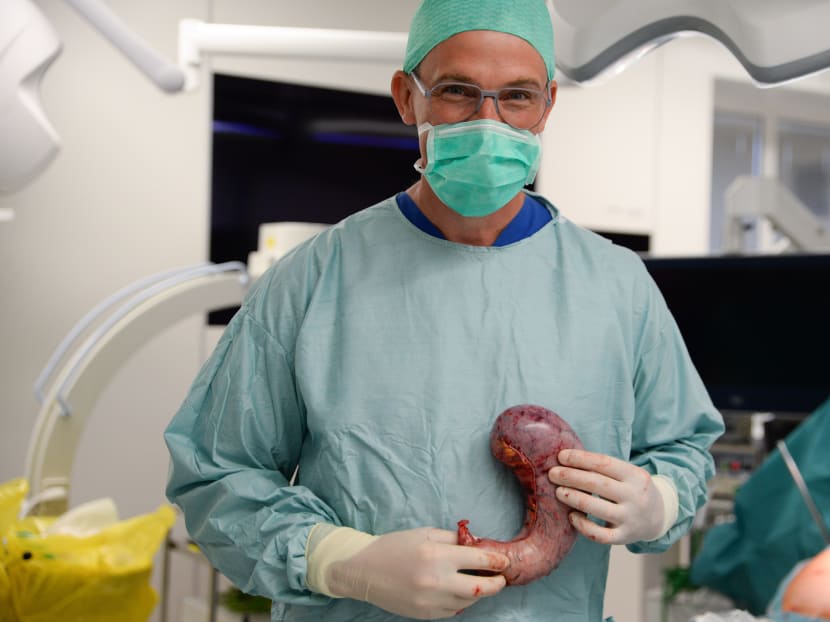A stomach for medical tourism in Estonia
SINGAPORE — In 2014, Swedish national Katarina Kiimalainen wanted to lose weight by undergoing bariatric surgery.

Estonia has seen an increase in foreign patients, who travel to the Baltic state to undergo surgery for a fraction of the price they would pay at home.
SINGAPORE — In 2014, Swedish national Katarina Kiimalainen wanted to lose weight by undergoing bariatric surgery.
She learned it would cost 120,000 Swedish kronas (S$18,600) and she would have to wait two years for the operation in Stockholm. Even then, she could not have the surgery of her choice.
After reading about weight loss procedures in Estonia, she chose to undergo gastric plication, which would reduce her stomach size by folding it inwards, in the Baltic state. She paid 42,500 Swedish kronas for the procedure, a fraction of what it would have cost her at home.
Two years later, she returned to the capital Tallinn for another weight loss procedure, this time to remove excess fat and skin from her abdomen and upper arms.
“I’m really happy that I dared to go to Estonia to do these surgeries,” said Ms Kiimalainen, 48, who has lost 26kg from her previous weight of 109kg.
Ms Kiimalainen is among a growing number of people who travel from near-by Finland, Sweden, Norway and Iceland, and even from as far as the United Kingdom, to undergo medical procedures in Estonia.
They are attracted by lower prices and the good quality of healthcare, said medical experts in Tallinn.

About 1.2 per cent of the country’s visitors arrived for health treatments in 2017, up from 0.6 per cent in 2016. Last year’s figure was the highest since 2014, when medical tourism data first became available.
These unofficial estimates are based on data collected over roughly two months every year. Meanwhile, overall tourism rose three per cent last year to 6.1 million visitors.
Foreign patients typically want orthopaedic, plastic or weight loss surgeries. Bariatric procedures in particular are becoming more popular, said Mr Sten Dubin, managing partner at The Health Clinic, one of the largest medical travel agencies.
“The quality of service and surgeons is very good here due to the Soviet era. It brought good scientists to Estonia,” said Mr Dubin, 34.
He said that Estonia’s proximity to Scandinavian countries, known for their high cost of living, is another reason for the increase in medical tourists.
“In medicine, you don’t always want the cheapest. So you come to the next best thing, where quality meets price — and out of all the Baltic countries, Estonia is the most advanced,” he said.
Gastric sleeve, a common bariatric procedure in which surgeons remove about 85 per cent of the stomach, costs about 6,000 euros (S$9,600) in Estonia compared to about 9,000 euros in Finland and 80,000 Swedish kronas (S$12,400) in Sweden.
Companies such as Tallinn-based Medicredit also offer loans and payment in monthly installments, increasing patients’ access to the procedures.
MEDICAL TRAVEL AGENCIES
Agencies, such as The Health Clinic, profit from commissions paid by surgeons. The agencies don’t charge patients such as Ms Kiimalainen extra fees. This helps to keep procedures affordable, said Mr Dubin.
Founded nine years ago, the agency caters to patients from overseas as well as other parts of Estonia. It started out with just 60 foreign patients in 2010, but this number has risen steadily over the years: in 2015, the clinic saw 174 patients from overseas, and last year, the number reached 281.
It brought in some 1.4 million euros in revenue last year, up from 800,000 euros in 2016. It expects to earn more than two million euros by the end of this year.
The agency’s coordinators arrange the itinerary for patients’ trips: they book ferry and plane tickets; receive them when they arrive; shuttle them to the hospitals and hotels; and follow up with them after surgery.
Patients usually consult the surgeons at The Health Clinic’s office in central Tallinn, before undergoing the procedures at the agency’s partner hospitals. They are also given an information booklet and a menu, created by the agency’s clinical nutrition therapist, tailored to their post-surgery dietary needs.
Medical travel agencies like The Health Clinic allow patients to receive efficient treatment and prompt answers to their queries, as patient coordinators liaise with them closely, said Mr Dubin.
“If you write to a hospital or a surgeon, you could wait for a long time to get an answer. Here, it’s like an information highway, and if patients want to do an operation, they will get it as soon as possible.”
BURGEONING MEDICAL TOURISM INDUSTRY
The healthcare community has also set up Medicine Estonia, an organisation that promotes the country’s medical services to patients who live abroad. Estonia has two healthcare hubs: its capital, Tallinn, and Tartu, its second largest city, due to the university hospital and medical faculty at the University of Tartu
There is stiff competition among hospitals, in both attracting foreign patients and serving the country’s small population of 1.3 million, said Dr Lauri Maisvee, 48, head of Fertilitas’ surgery department.
“Every patient is so valuable, so you have to earn your reputation.”
Fertilitas saw about 1,000 foreign patients last year, mostly from Finland. The number of overseas patients has risen by about 100 every year, over the past few years, said Dr Maisvee.
Plastic surgeries are the most popular procedures among foreign patients at Fertilitas, but there has been a rise in the number of bariatric surgeries recently, he added.
REASONS FOR SUCCESS
The high quality of healthcare is partly due to doctors’ efforts to keep up to date with the latest medical technology, said Dr Maisvee. After Estonia gained independence from the Soviet Union in 1991, it rapidly adopted the latest advancements in technology.
“We were forced to expand in a short period of time. We went from landlines to mobile phones, without having beepers. We didn’t have cheque books. Instead, we had mobile banking. The same applies to medical technology.”
Better marketing, ease of travel and cheaper prices have contributed to the medical tourism boom here, he said.

It also helps that many doctors speak several languages, which enables them to communicate with foreign patients.
An example is bariatric surgeon Ilmar Kaur, who speaks Finnish, English, Russian and Estonian. Dr Kaur, who is well-known in the healthcare industry, is the head surgeon at Bariatric Services, a private clinic that caters to foreign patients. The clinic’s surgeons operate at Fertilitas, which houses Bariatric Services’ office, and the North Estonia Medical Centre.
“In their home countries, patients may be put on long waiting lists, so they seek treatment elsewhere at lower costs,” said Dr Kaur, 44.
After a bariatric surgery, foreign patients usually stay in the hospital for three nights, so they may recover before travelling home, said Dr Andre Trudnikov, head of the Center of General and Oncological Surgery at East-Tallinn Central Hospital.
East-Tallinn receives fewer foreign patients than private hospitals, but it has still seen a 20 per cent annual increase in the number of bariatric patients from overseas, added Dr Trudnikov, 50.
“People find out about our services through technology and word of mouth. It’s taking time, but we are reaching a few hundred foreign patients.”
LOOKING AHEAD
As people become more mobile, Estonia expects the number of foreign patients in its healthcare system to increase, said the Ministry of Social Affairs, which oversees healthcare in the country.
However, the ministry’s priority is to ensure that residents have good access to the healthcare system and to promote “cooperation and networking” of healthcare facilities for the treatment of rare conditions, it added.
Estonia’s medical tourism scene faces some challenges as it continues to grow. These include rising competition from neighbours like Latvia and Lithuania, and a slight brain drain as some doctors leave for countries with higher pay, said Dr Trudnikov.
In addition, there are only a few fields in which medical tourism can thrive in, as some procedures have high complication rates and long recovery periods.
“For those, it’s quite difficult to go home after just a week. That’s why not all patients travel all around the world for medical care.”
Despite these challenges, doctors expect a further increase in the number of foreign patients.
Patients are willing to visit another country to undergo surgeries as they want privacy, especially in fields such as plastic surgery, said Mr Dubin from The Health Clinic.
He added: “You can just come here and nobody will know you. You can hop in and hop out.”
This piece was produced as part of the Wee Kim Wee School of Communication and Information’s Going Overseas for Advanced Reporting (Go-Far) course. Go-Far is an advanced journalism reporting course that immerses students in the challenges of operating in another country and culture.






